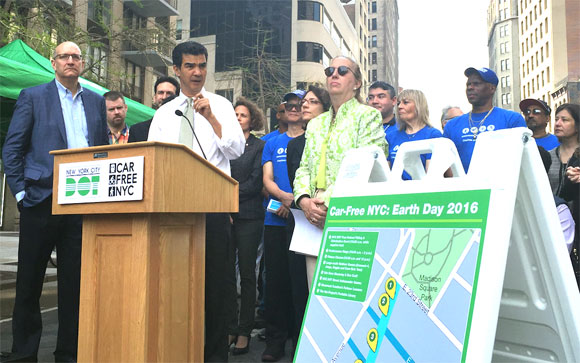
New York City is America's car-free capital, home to eight and half million people, most of whom get around without owning a car. When so many of us already live car-free, what more can come out of an event like last Friday's Car-Free Day?
There are basically two ways an awareness-raising event like Car-Free Day can go. It can be a big galvanizing moment, like the original Earth Day in 1970, that shows the political strength of a social movement and leads to real public policy changes. Or it can be an exercise in conscience soothing and public relations, like the modern incarnation of Earth Day, where governments, corporations, and private citizens "go green" for a day, then carry on with business as usual the next morning.
Car-Free Day 2016 wasn't what you would call a big galvanizing moment.
Don't get me wrong. City Council transportation chair Ydanis Rodriguez mobilized an impressive coalition for the day, working on a short schedule with, I'm guessing, a tiny budget. And it's great that some of NYC's large employers asked people to get to work without a car. Most of us do that already, sure, but more than a million of us do not. Maybe some habitual car commuters switched things up on Car-Free Day and found that the train, bus, or bike works better than they thought.
The trouble is, Car-Free Day was not tied to any concrete public policy proposals that would get the city closer to Rodriguez's goal of reducing private car ownership. Transportation Commissioner Polly Trottenberg ran down the list of what NYC DOT is doing to make streets safer for walking and biking, but those projects were already in the works.
Like San Francisco's version of Bike to Work Day, where every elected official from the mayor on down gets seen biking to City Hall without making any real policy commitments, New York's Car-Free Day didn't take on much more significance than a photo op.
Making the car-free zones bigger would be nice, but to give this event some real weight it needs to be anchored to a concrete, achievable policy agenda. If Car-Free Day is going to be an annual thing in New York, the ideas, the sense of urgency, and the willingness to change public policy need to be much more prominent.
It can be done. Paris Mayor Anne Hidalgo made a big splash with a Car-Free Day last year, dramatically reducing the number of private cars in one-third of the city. The event mattered not so much because it was big (though the bigness helped) but because it was tied to a broader agenda of transit expansions and major pedestrianization projects.
When Summer Streets launched in New York in 2008, the idea was similar -- a big car-free event that introduced many New Yorkers to the idea that streets can change and cars don't need to monopolize so much space all the time. The city got to try Summer Streets on for size before embarking on permanent changes like plazas, bike lanes, and bus lanes.
New York could use another jolt like that. The city is making progress, rolling out a few miles of protected bike lanes and a couple of enhanced bus routes each year, but not pushing the envelope. The sense of innovation and ambition has dissipated. It's been a long time since Mayor de Blasio spoke up in public or spent significant political capital to advance his Vision Zero goal of ending traffic deaths.
Meanwhile, in Paris, Hidalgo is thinking bigger, proposing to boot cars off a large chunk of the city's waterfront expressway. In London, Mayor Boris Johnson is going out with a bang, leapfrogging New York's bike infrastructure by providing miles of continuous, low-stress riding conditions with upgrades to the city's "cycle superhighways."
De Blasio wasn't the instigator of New York's Car-Free Day, and maybe the mayor doesn't need to be. Maybe it can work as a City Council-led event -- a day where council members prod City Hall to action.
This hypothetical version of Car-Free Day would look a lot different than what happened last Friday. It would be a day where council members map out how they want to change the streets of the neighborhoods they represent: where transit urgently needs priority over cars, where safer bike routes would help their constituents the most, where traffic lanes should be turned into public space for people. They could declare their support for reforming on-street parking prices to reduce traffic, or call on the city to eliminate parking minimums in their district to make housing more affordable.
These are all aspects of public policy that council members could get City Hall to act on. They don't require complex and unlikely acts of coordination with state agencies or the federal government. More than a few members of the current City Council would probably have great, specific ideas along these lines.
A Car-Free Day dedicated to achieving permanent traffic reduction policies is worth another shot.
But an annual event where politicians put in an appearance, say a few empty phrases, and pose for the press? New York can do without that.





